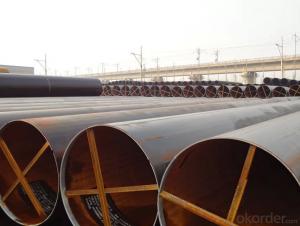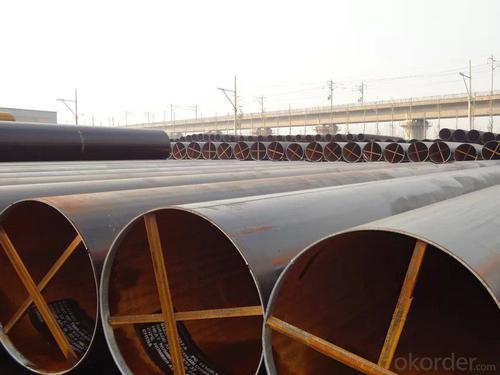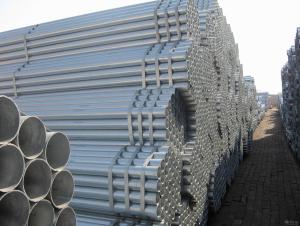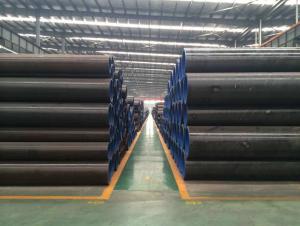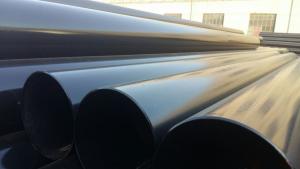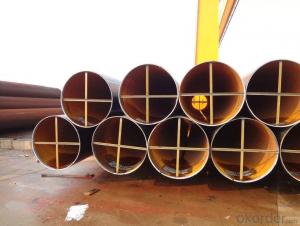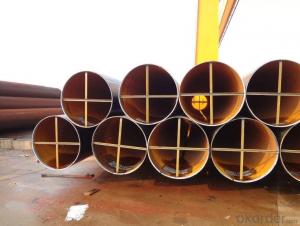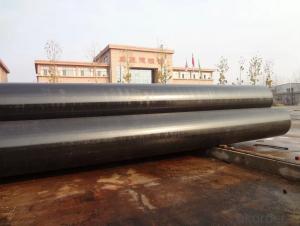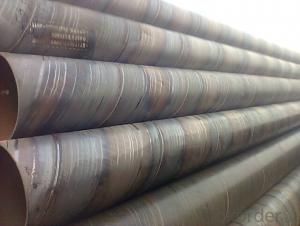Large diameter double sided submerged arc welded pipes
- Loading Port:
- Tianjin
- Payment Terms:
- TT or LC
- Min Order Qty:
- 25 m.t.
- Supply Capability:
- 12000 m.t./month
OKorder Service Pledge
OKorder Financial Service
You Might Also Like
Product Description:
1、Structure of Welded Steel Tube:
Welded Steel Tube is formed by drawing a solid billet over a piercing rod to create the hollow shell. We are company that have many years experience and professional manager team and engineer team and sales team, sure we will provide you high quality of welded pipe and professioanl service.
2、Main Features of the Welded Steel Tube:
• High manufacturing accuracy
• The higher strength
• The small inertia resistance
• Strong heat dissipation ability
• Good visual effect
• Satisfy price
3、Welded Steel Tube Specification:
Standard | Grade | (MPa) | (MPa) | ||
Yield strength | Tensile Strength | ||||
API SPEC 5L | PSL1 | ||||
B | ≥241 | ≥414 | |||
×42 | ≥290 | ≥414 | |||
×46 | ≥317 | ≥434 | |||
×52 | ≥359 | ≥455 | |||
×56 | ≥386 | ≥490 | |||
×60 | ≥414 | ≥517 | |||
×65 | ≥448 | ≥531 | |||
×70 | ≥483 | ≥565 | |||
PSL2 | |||||
| Min | Max | Min | Max | |
B | 241 | 448 | 441 | 758 | |
×42 | 290 | 496 | 414 | 758 | |
×46 | 317 | 524 | 434 | 758 | |
×52 | 359 | 531 | 455 | 758 | |
×56 | 386 | 544 | 490 | 758 | |
×60 | 414 | 565 | 517 | 758 | |
×65 | 448 | 600 | 531 | 758 | |
×70 | 483 | 621 | 565 | 758 | |
Chemical Composition(%)
Standard | Grade | C | Mn | P | S | CEV |
Max | Max | Max | Max | Max | ||
PSL1 |
- | |||||
B | 0.26 | 1.2 | 0.030 | 0.030 | ||
×42 | 0.26 | 1.3 | 0.030 | 0.030 | ||
×46,×52,×56,X60 | 0.26 | 1.4 | 0.030 | 0.030 | ||
X65 | 0.26 | 1.45 | 0.030 | 0.030 | ||
X70 | 0.26 | 1.65 | 0.030 | 0.030 | ||
PSL2 |
0.43 | |||||
B | 0.22 | 1.20 | 0.025 | 0.015 | ||
1) Material: Grade:API 5L GR.B, X40, X42, X52, X56, X60, X65, X70.ST37/37-2,ST33,ST35.8,ST35.4.GB 9711.1/SY5037/GB3092
2) Specification range: OD: 406.4MM-1422MM (16”-56”)
Thickness: 8MM-50.8MM depends on OD
3) Excutive standards:GB,ASME API5L.ASTM A 106/A53,Despite of the above standards,we can also supply seamless steel pipe with standard of DIN,JIS,and so on,and also develop new products according to the requirements of our clients!
4) Surface:black lacquered,varnish coating or galvanized.
5) Ends:Beveled or square cut,plastic capped,painted.
6) Packing:bundles wrapped with strong steel strip,seaworthy packing.
4、Packaging & Delivery
Packaging Details: | seaworthy package,bundles wrapped with strong steel strip |
Delivery Detail: | 15-30days after received 30%TT |
5、FAQ of Welded Steel Tube:
①How is the quality of your products?
We have many years business experience in this area, and we have professional engineer and manager team and sure we can provide you high quality production and professional service.
②How about price?
If you like bargain and factory price is not low enough as you think, just don’t waste your time.Please trust the quotation we would give you, it is professional one.
③Why should you chose us?
We can give you both.Additionally, we can also offer professional products inquiry, products knowledge train(for agents), smooth goods delivery, exellent customer solution proposals.Our service formula: good quality+good price+good service=customer’s trust.
6、 Welded Steel Tube Images:
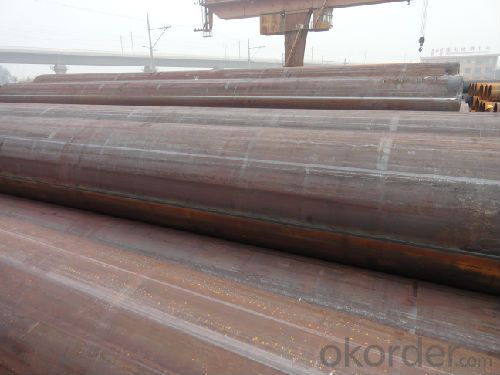
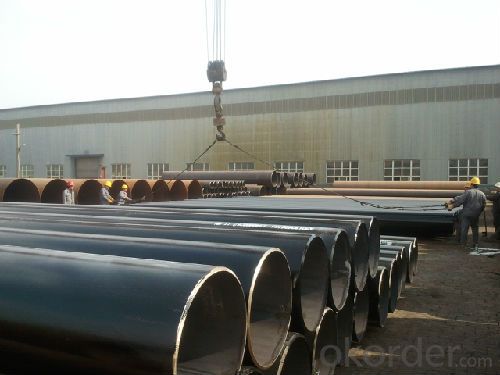
- Q: Can steel pipes be used for natural gas distribution?
- Yes, steel pipes can be used for natural gas distribution. Steel pipes are commonly used in the natural gas industry due to their strength, durability, and ability to withstand high pressure. They are capable of safely transporting natural gas over long distances and are often preferred for their resistance to corrosion and leaks.
- Q: What is the fatigue strength of steel pipes?
- The fatigue strength of steel pipes refers to their ability to withstand repeated cyclic loading without experiencing failure. It is a critical characteristic for pipes that are subject to dynamic or fluctuating loads, such as those used in the oil and gas industry, transportation infrastructure, or industrial applications. The fatigue strength of steel pipes can vary depending on several factors, including the steel grade, pipe dimensions, manufacturing process, surface conditions, and environmental factors. Steel pipes with higher tensile strength and toughness generally exhibit better fatigue resistance. The fatigue strength is typically determined through fatigue testing, which involves subjecting the pipes to cyclic loading until failure occurs. The results are then used to establish a fatigue curve or S-N curve, which represents the relationship between the applied stress amplitude and the number of cycles to failure. The fatigue strength is commonly expressed as the stress amplitude required to cause failure after a specific number of cycles, such as the stress amplitude at 10 million cycles (S-N10^7). It is important to note that fatigue strength is influenced by other factors, such as mean stress, surface finish, and loading frequency, which may need to be considered in specific applications. Overall, the fatigue strength of steel pipes is a crucial factor to consider in engineering design and maintenance, as it helps ensure the long-term integrity and reliability of the pipes under cyclic loading conditions.
- Q: How are steel pipes used in the manufacturing of furniture and appliances?
- Steel pipes are commonly used in the manufacturing of furniture and appliances for various purposes. They are used as structural components to provide stability and support, especially in items like chairs, tables, and bed frames. Steel pipes are also used as frames or frames within frames for cabinets, shelves, and storage units, offering durability and strength to hold heavy objects. Additionally, steel pipes can be used as handles or legs for appliances, ensuring stability and easy mobility. Overall, steel pipes play a crucial role in enhancing the strength, stability, and functionality of furniture and appliances in the manufacturing process.
- Q: What are the specifications for steel pipes used in high-pressure applications?
- The specifications for steel pipes used in high-pressure applications typically include factors such as material composition, wall thickness, diameter, and pressure rating. These pipes are often made from strong and durable steel alloys, such as carbon steel or stainless steel, to ensure their ability to withstand high pressures. The wall thickness and diameter of the pipe are carefully selected to handle the specific pressure requirements of the application. Additionally, the pipes may need to meet certain industry standards, such as ASTM or ASME codes, to ensure their quality and performance in high-pressure environments.
- Q: Can steel pipes be coated for aesthetic purposes?
- Indeed, steel pipes have the potential to be coated solely for aesthetic reasons. By applying coatings to steel pipes, not only can one achieve an attractive appearance, but also safeguard them against corrosion and other environmental influences. Numerous coating choices are at one's disposal when it comes to steel pipes, including powder coating, epoxy coating, and vinyl coating, among others. These coatings can be employed in various colors and textures to enrich the pipes' visual appeal and harmonize with their surroundings. Whether utilized in industrial settings, architectural endeavors, or for decorative purposes, the act of coating steel pipes has the power to metamorphose them into visually captivating components, all while preserving their structural integrity.
- Q: What's the difference between steel pipe and pipe fittings?
- Pipe fittings: parts that connect pipes to pipes. According to the connection method can be divided into socket type pipe fittings, threaded fittings, flange pipe fittings and welding pipe fittings four kinds. Multipurpose; made of the same material as pipes. Elbow (elbow), flange, three pipe and four pipe (crosshead) and reducer (reducer) etc.. Elbow for pipeline corner; flange for the pipe and pipe interconnected parts, connected to the pipe end, three pipe for three pipe collection; four pipe for four tubes together place; for two pipes of different diameters connected to different diameter pipe.
- Q: Are steel pipes suitable for underground sewage systems?
- Yes, steel pipes are suitable for underground sewage systems. Steel pipes are known for their strength, durability, and resistance to corrosion, making them an ideal choice for underground installations. Steel pipes can withstand the pressure and weight of the soil above, ensuring the integrity of the sewage system. Additionally, steel pipes have a long lifespan and can withstand extreme temperatures and environmental conditions, making them a reliable choice for underground applications. However, it is important to note that proper coating and insulation should be applied to steel pipes to prevent corrosion and ensure longevity.
- Q: What are the common standards for steel pipe manufacturing?
- The common standards for steel pipe manufacturing include specifications set by organizations such as the American Society for Testing and Materials (ASTM), the International Organization for Standardization (ISO), and the American National Standards Institute (ANSI). These standards cover various aspects such as size, dimensions, material properties, manufacturing process, and testing requirements to ensure the quality and consistency of steel pipes.
- Q: Can steel pipes be used for underground water wells?
- Yes, steel pipes can be used for underground water wells. Steel pipes are commonly used for drilling water wells due to their durability, strength, and resistance to corrosion. However, it is important to ensure that the steel pipes are properly coated and protected to prevent any contamination of the underground water source.
- Q: Can stainless steel pipes spray black paint?
- Stainless steel pipes can spray black paint.The stainless steel surface with a layer of smooth surface, so the painting before the need to use corner grinder or iron brush to paint out into hair and then paint. Otherwise, spray paint can not be adhered to the surface of the stainless steel pipe.
Send your message to us
Large diameter double sided submerged arc welded pipes
- Loading Port:
- Tianjin
- Payment Terms:
- TT or LC
- Min Order Qty:
- 25 m.t.
- Supply Capability:
- 12000 m.t./month
OKorder Service Pledge
OKorder Financial Service
Similar products
Hot products
Hot Searches
Related keywords
